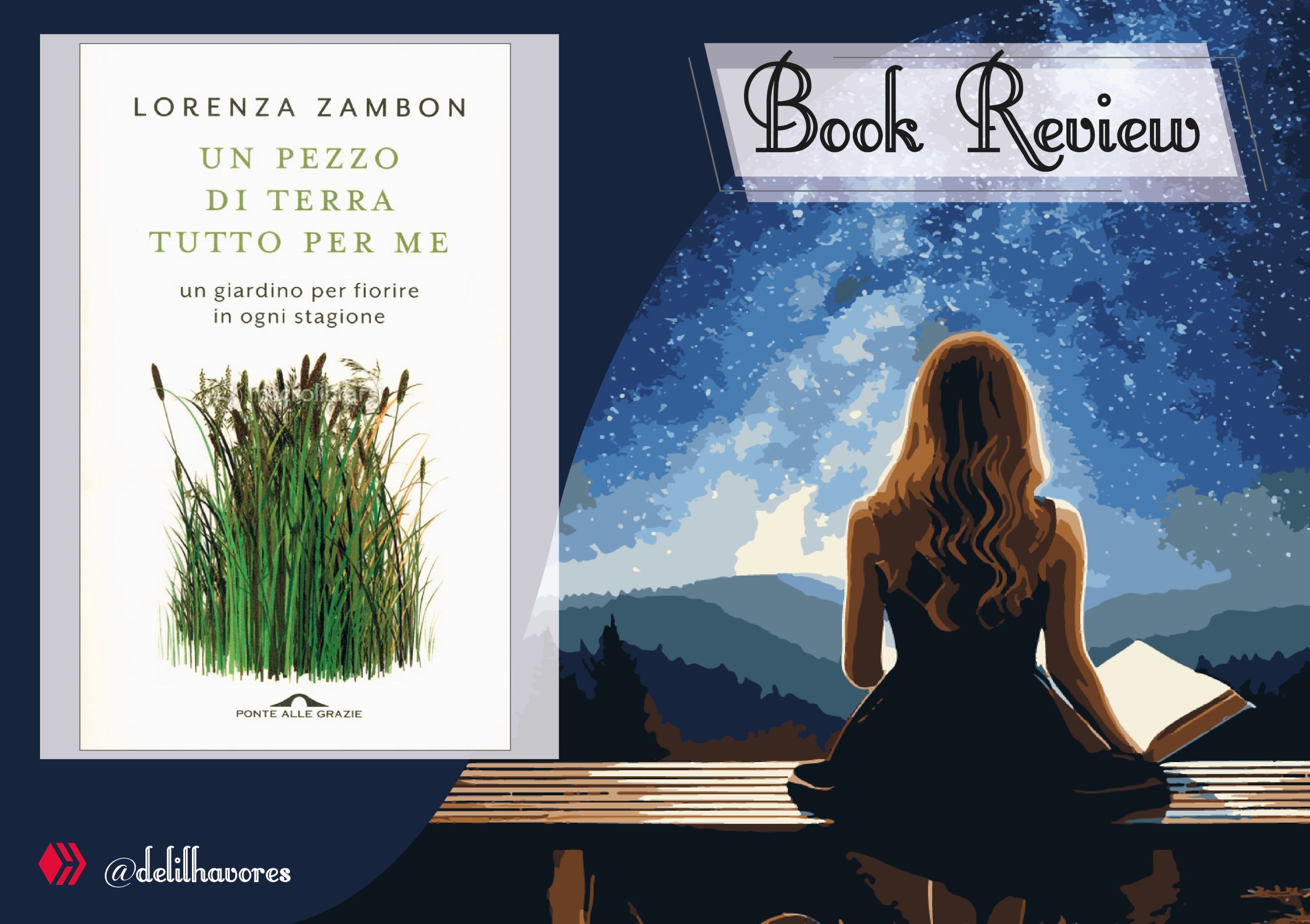ENG
Good morning Hive Book Club friends!
The book I am talking about today is very intimate. It feels like entering the author's personal sphere, observing her experiences through a keyhole. It’s a short book, just a few pages, but somehow it shakes you inside your soul.
It talks about the relationship with nature and some similarities between society and plants.
Enjoy your reading!
ITA
Buongiorno amici di Hive Book Club!
Il libro di cui vi parlo oggi è molto intimo. Sembra di entrare nella sfera personale dell’autrice, osservando le sue vicende dal buco di una serratura. È un libro breve, di poche pagine, ma in qualche modo ti scuote all’interno dell’anima.
Parla del rapporto con la natura e di alcune similitudini tra la società e le piante.
Buona lettura!


Technical data
Title: “Un pezzo di terra tutto per me. Un giardino per fiorire in ogni stagione” (“A piece of land all for me. A garden to bloom in every season”)
Year of publication: 2018
Publisher: Ponte alle Grazie
Number of pages: 96
Author
The author of the book is called Lorenza Zambon. I admit that I didn’t know this writer before reading this book.
It was enlightening because I discovered that she was the founder, together with others, of the famous “Casa degli Alfieri”, an artistic production center on the hills of Monferrato (Italy), a place created for artists, to develop theater and creative skills immersed in nature.
She is called “gardener actress”, because these are her two main activities. I must say that it’s a beautiful description! She produced a festival called “Naturalmente arte”, where the heart is the theatrical shows designed for natural places, woods and parks.
Plot and personal considerations
A group of artists decide to go and live in a remote location on the hills of Monferrato and found a community called Casa degli Alfieri. In this book, the writer tells us about the entire process that led to the production of this wonderful microcosm.
In places like that, you can clearly feel the differences between the seasons, and there are close encounters with unusual animals and plants, not always positive.
A funny aspect is how the author tells us the dimensions of this place: “It is seventy-seven paces wide. It is two hundred and forty paces long, that is, it is a little less than five minutes long, at the pace of the one who measures. A quarter of an hour, if you look around without stopping. Maybe half an hour chatting. A time out of time, if you are enchanted”. From these simple words you can understand that it is a magical garden, where space and time really stop, in contrast with our super frenetic society.
Spending time immersed in nature gives a lot of serenity and this is perfectly perceived from the pages of the book. As I said in the introduction, it’s a very intimate text, and it almost seems like we are spying on the writer's adventures through the keyhole of the door.
Being able to plant a plant, fertilize it, see a flower bloom, are all dynamics that the earth gives us and that we must take as teachings. In this book you can perceive the importance of being part of a larger life cycle, that of nature.
One of my favorite passages is when she tells of a summer night spent outdoors, sleeping under the stars and the moonlight. Obviously there was a lot of fear in the writer's words, because at the slightest noise it could be a wolf or a wild boar. Nonetheless, it’s a magical experience that I have never had in my life and that I was happy to read!
Dati tecnici
Titolo: “Un pezzo di terra tutto per me. Un giardino per fiorire in ogni stagione”
Anno di pubblicazione: 2018
Casa editrice: Ponte alle Grazie
Numero di pagine: 96
Autore
L’autrice del libro si chiama Lorenza Zambon. Ammetto che non conoscevo questa scrittrice prima di leggere questo libro.
È stato illuminante perché ho scoperto essere la fondatrice, insieme ad altri, della famosa “Casa degli Alfieri”, un centro di produzione artistica sulle colline del Monferrato (Italia), un luogo nato per gli artisti, per sviluppare il teatro e le doti creative immersi nella natura.
Viene definita “attrice giardiniera”, perché queste sono le sue due attività principali. Devo dire che è una bellissima descrizione! Ha prodotto un festival che si chiama “Naturalmente arte”, dove il cuore sono gli spettacoli teatrali pensati per luoghi naturali, boschi e parchi.
Trama e considerazioni personali
Un gruppo di artisti decide di andare a vivere in una località sperduta sulle colline del Monferrato e fondare una comunità chiamata Casa degli Alfieri. In questo libro la scrittrice ci racconta tutto il processo che ha portato alla produzione di questo microcosmo meraviglioso.
In luoghi come quello, si avvertono molto chiaramente le differenze tra le stagioni, e ci sono incontri ravvicinati con animali e piante insolite, non sempre positivi.
Un aspetto divertente è come l’autrice ci riporta le dimensioni di questo luogo: “È largo settantasette passi. È lungo duecentoquaranta passi, cioè è lungo un po' meno di cinque minuti, al passo di chi misura. Un quarto d'ora, se ci si guarda in giro senza fermarsi. Forse mezz'ora chiacchierando. Un tempo fuori dal tempo, se ci si incanta”. Da queste semplici parole si può capire che è un giardino magico, dove lo spazio e il tempo si fermano davvero, in contrasto con la nostra società super frenetica.
Passare del tempo immersi nella natura dona molta serenità e questo si percepisce perfettamente dalle pagine del libro. Come dicevo nell’introduzione, si tratta di un testo molto intimo, e sembra quasi di spiare dalla serratura della porta le vicende della scrittrice.
Poter piantare una pianta, concimarla, vedere sbocciare un fiore, sono tutte dinamiche che la terra ci regala e che dobbiamo prendere come insegnamenti. In questo libro si percepisce l’importanza di essere parte di un ciclo vitale più grande, quello della natura.
Uno dei miei passaggi preferiti è quando racconta di una notte d’estate passata all’aperto, dormendo sotto le stelle e la luce della Luna. Ovviamente c’era tanta paura nelle parole della scrittrice, perché al minimo rumore poteva essere un lupo o un cinghiale. Ciò nonostante, si tratta di un’esperienza magica che non ho mai fatto nella mia vita e che ho avuto piacere di leggere!

Favorite Quotes
“Young trees are all alike; old trees are all different. Shaped differently by time, crooked, each represents a sculpture in itself. This is what happens to us if we are lucky and grow old. When you are old you are freer and can be more original: there is no one like you”.
“I’m sure that this garden will never be finished. In my own time! I will plant two or three roses this fall, two bushes next spring, the following fall a hundred daffodils and so on. It will never end. That is why it’s beautiful: it will never end. So this exciting game will never end, which captures me more and more every day”.
“In the garden there is something similar to the presumption and pleasure of creation: you can shape a piece of land as you want”.
“Plants are living beings made up of a series of small modules that repeat themselves and that in some cases can even live alone. In them everything is diffuse and decentralized, they are more similar to a colony than to an individual. Each single fragment is capable of self-management and so they have a distributed and ramified intelligence and government. If you think about it, the Internet seems inspired by the same plant paradigm, which is the quintessence of modernity: a modular, cooperative, extended architecture without command centers, capable of resisting predators and catastrophes without ceasing to function”.
Conclusion
This book is very easy to read, light, but at the same time it’s able to reach directly to the heart.
I would recommend it to nature lovers, a bit rebellious, who would like to create their own microcosm like Lorenza's.
Thank you for reading me! Do you know other interesting books on this topic?
See you next time,
Delilha
Citazioni preferite
“Gli alberi giovani sono tutti simili; gli alberi antichi, tutti differenti. Conformati diversamente dal tempo, storti, rappresentano ciascuno una scultura a sé. È quel che avviene a noi se siamo fortunati e diventiamo vecchi. Da anziano sei più libero e puoi essere più originale: forgiato come te, non c’è nessuno”.
“Sono sicura che questo giardino non sarà mai finito. Con i miei tempi! Pianto due o tre rose questo autunno, due cespugli la prossima primavera, l’autunno dopo cento narcisi e via così. Non finirà mai. Proprio per questo è bello: non finirà mai. Così non finirà questo gioco appassionante, che mi cattura ogni giorno di più”.
“Nel giardino c’è qualcosa di simile alla presunzione e al piacere della creazione: si può plasmare un pezzetto di terra come si vuole”.
“Le piante sono esseri viventi fatti di una serie di piccoli moduli che si ripetono e che in certi casi possono vivere anche da soli. In loro tutto è diffuso e decentrato, sono più simili a una colonia che a un individuo. Ogni singolo frammento è capace di autogestirsi e così hanno un’intelligenza e un governo distribuiti e ramificati. A pensarci Internet sembra ispirata allo stesso paradigma vegetale, che è la quintessenza della modernità: un’architettura a moduli, cooperativa, estesa e senza centri di comando, capace di resistere a predatori e catastrofi senza smettere di funzionare”.
Conclusione
Questo libro è molto scorrevole da leggere, leggero, ma allo stesso tempo è in grado di arrivare direttamente al cuore.
Lo consiglierei agli appassionati della natura, un po’ ribelli, che vorrebbero creare un proprio microcosmo come quello di Lorenza.
Grazie per avermi letto! Conoscete altri libri interessanti su questo tema?
Alla prossima,
Delilha








